Tingyuan Liang
DAPO: Design Structure-Aware Pass Ordering in High-Level Synthesis with Graph Contrastive and Reinforcement Learning
Dec 12, 2025Abstract:High-Level Synthesis (HLS) tools are widely adopted in FPGA-based domain-specific accelerator design. However, existing tools rely on fixed optimization strategies inherited from software compilations, limiting their effectiveness. Tailoring optimization strategies to specific designs requires deep semantic understanding, accurate hardware metric estimation, and advanced search algorithms -- capabilities that current approaches lack. We propose DAPO, a design structure-aware pass ordering framework that extracts program semantics from control and data flow graphs, employs contrastive learning to generate rich embeddings, and leverages an analytical model for accurate hardware metric estimation. These components jointly guide a reinforcement learning agent to discover design-specific optimization strategies. Evaluations on classic HLS designs demonstrate that our end-to-end flow delivers a 2.36 speedup over Vitis HLS on average.
Explainable Fuzzy Neural Network with Multi-Fidelity Reinforcement Learning for Micro-Architecture Design Space Exploration
Dec 14, 2024Abstract:With the continuous advancement of processors, modern micro-architecture designs have become increasingly complex. The vast design space presents significant challenges for human designers, making design space exploration (DSE) algorithms a significant tool for $\mu$-arch design. In recent years, efforts have been made in the development of DSE algorithms, and promising results have been achieved. However, the existing DSE algorithms, e.g., Bayesian Optimization and ensemble learning, suffer from poor interpretability, hindering designers' understanding of the decision-making process. To address this limitation, we propose utilizing Fuzzy Neural Networks to induce and summarize knowledge and insights from the DSE process, enhancing interpretability and controllability. Furthermore, to improve efficiency, we introduce a multi-fidelity reinforcement learning approach, which primarily conducts exploration using cheap but less precise data, thereby substantially diminishing the reliance on costly data. Experimental results show that our method achieves excellent results with a very limited sample budget and successfully surpasses the current state-of-the-art. Our DSE framework is open-sourced and available at https://github.com/fanhanwei/FNN\_MFRL\_ArchDSE/\ .
FP-Stereo: Hardware-Efficient Stereo Vision for Embedded Applications
Jul 01, 2020
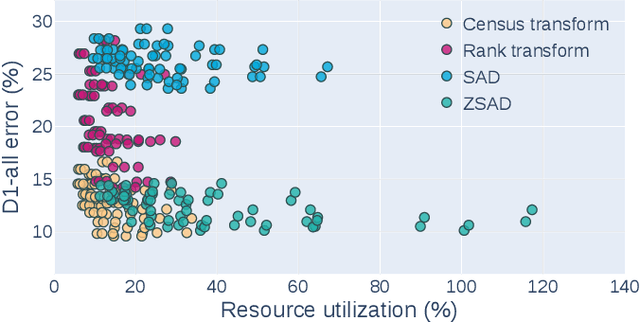
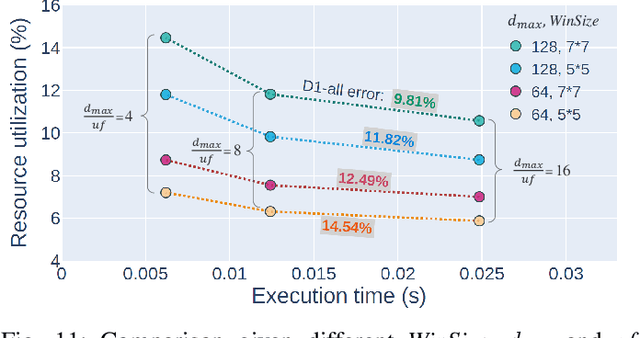
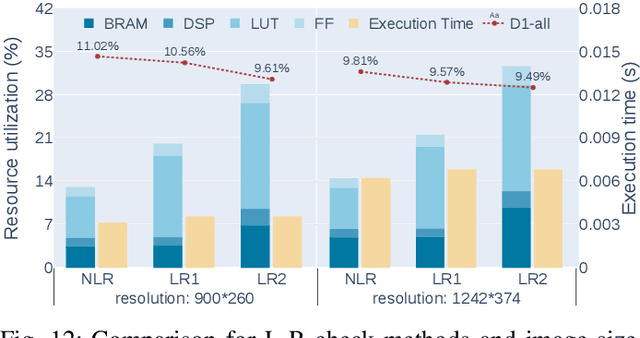
Abstract:Fast and accurate depth estimation, or stereo matching, is essential in embedded stereo vision systems, requiring substantial design effort to achieve an appropriate balance among accuracy, speed and hardware cost. To reduce the design effort and achieve the right balance, we propose FP-Stereo for building high-performance stereo matching pipelines on FPGAs automatically. FP-Stereo consists of an open-source hardware-efficient library, allowing designers to obtain the desired implementation instantly. Diverse methods are supported in our library for each stage of the stereo matching pipeline and a series of techniques are developed to exploit the parallelism and reduce the resource overhead. To improve the usability, FP-Stereo can generate synthesizable C code of the FPGA accelerator with our optimized HLS templates automatically. To guide users for the right design choice meeting specific application requirements, detailed comparisons are performed on various configurations of our library to investigate the accuracy/speed/cost trade-off. Experimental results also show that FP-Stereo outperforms the state-of-the-art FPGA design from all aspects, including 6.08% lower error, 2x faster speed, 30% less resource usage and 40% less energy consumption. Compared to GPU designs, FP-Stereo achieves the same accuracy at a competitive speed while consuming much less energy.
Machine Learning Based Routing Congestion Prediction in FPGA High-Level Synthesis
May 06, 2019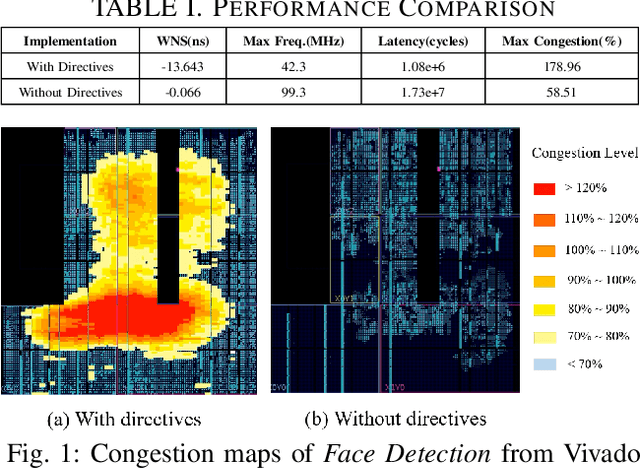
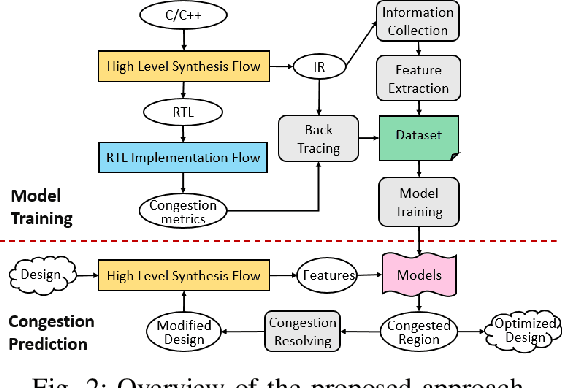
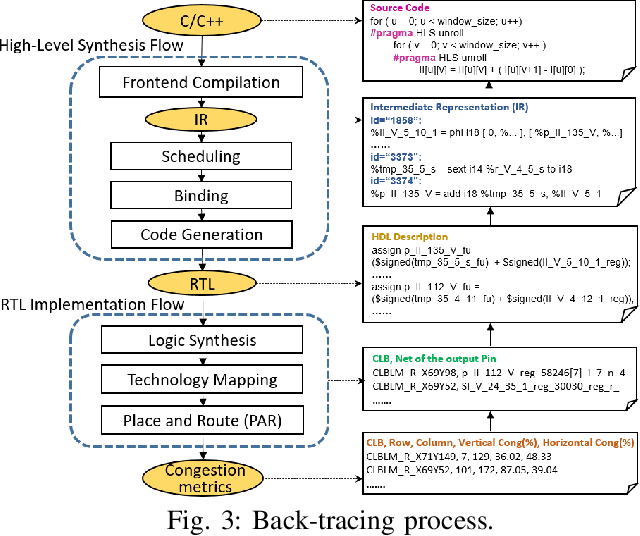
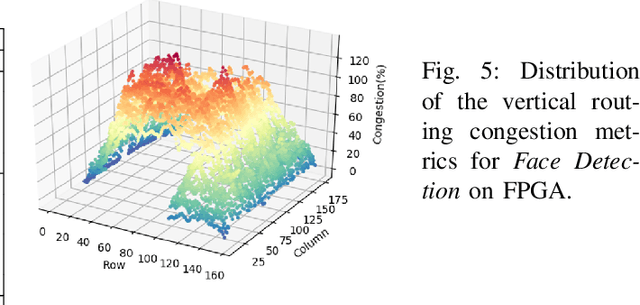
Abstract:High-level synthesis (HLS) shortens the development time of hardware designs and enables faster design space exploration at a higher abstraction level. Optimization of complex applications in HLS is challenging due to the effects of implementation issues such as routing congestion. Routing congestion estimation is absent or inaccurate in existing HLS design methods and tools. Early and accurate congestion estimation is of great benefit to guide the optimization in HLS and improve the efficiency of implementation. However, routability, a serious concern in FPGA designs, has been difficult to evaluate in HLS without analyzing post-implementation details after Place and Route. To this end, we propose a novel method to predict routing congestion in HLS using machine learning and map the expected congested regions in the design to the relevant high-level source code. This is greatly beneficial in early identification of routability oriented bottlenecks in the high-level source code without running time-consuming register-transfer level (RTL) implementation flow. Experiments demonstrate that our approach accurately estimates vertical and horizontal routing congestion with errors of 6.71% and 10.05% respectively. By presenting Face Detection application as a case study, we show that by discovering the bottlenecks in high-level source code, routing congestion can be easily and quickly resolved compared to the efforts involved in RTL implementation and design feedback.
 Add to Chrome
Add to Chrome Add to Firefox
Add to Firefox Add to Edge
Add to Edge